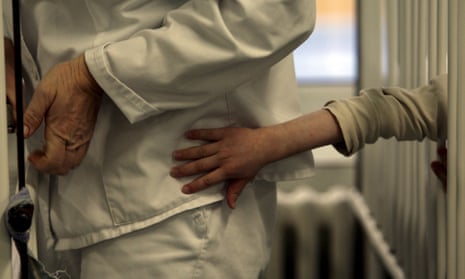I will never forget my first visit to an institution for children with disabilities in Eastern Europe. There were dozens of children, lying awake in the middle of the day, in a dark room. None of them made a sound. No talking, no crying, no moaning, no television or radio, nothing. Just row upon row of silent cribs.
A member of staff told me the children all had cerebral palsy and were unable to walk or talk. One boy, who looked like a small child, was 21 years old. “How long has he been here?” I asked. “Eleven years,” the staff member said. “His mother travels by bus once a month to visit him. She has other children and can’t take care of him.” “I mean, how long has he been in this crib?” I asked again. “Eleven years” she repeated. “He hasn’t been out of his crib for 11 years.”
There are millions of infants, children and adolescents locked away and forgotten about in institutions all over the world. But the adoption of the UN Convention on the Rights of Persons with Disabilities (CRPD) – ratified by 174 countries – and the recent comments of the UN Disability Committee, have made it clear this can’t continue.
The committee declared in August 2017: “Large or small group homes are especially dangerous for children, for whom there is no substitute for the need to grow up with a family. Family like institutions are still institutions and are no substitute for care by a family.”
This new standard usurps protections offered by the UN Convention on the Rights of the Child (CRC) which suggested that children would be better off with families, but left loopholes for “suitable institutions” to exist.
My organisation, Disability Rights International (DRI), has spent more than two decades exposing abuses perpetrated against children in institutions. We know there’s no such thing as a suitable institution for a child. DRI has found children denied available medical care and left to die, trafficked for sex, organs, labour and illegal adoptions. There are immobile children left in cribs for years, staff who believe children with disabilities don’t feel pain, children permanently left in restraints and seclusion.
In babies and small children, there’s evidence to show neglect, lack of stimulation and the absence of a consistent and loving family alters brain development and impairs all other areas of normal growth. Therefore even children who enter institutions without disabilities are likely to develop them by living there.
International donors, NGOs, faith-based organisations and governments will now have to rethink how they will spend their time and money to keep children in families rather than building and supporting residential institutions. It should be cheaper – research shows that group placements of children costs seven to 10 times as much as placing a child with a family. Many institutionalised children will also be able to be reintegrated with their biological families – 95% of them still have a surviving parent or extended family. Where this is not possible, foster families should be considered.
But those families will still need support in the form of community-based services – especially those poorer families. We have seen many examples of children with disabilities kept at home being locked in their bedrooms all day while the parents work. Accessible schools, supporting grandparents or neighbours to help out, or building an integrated day care centre, could all help more than institutions ever could.
The UN CRPD committee’s mandate leaves no room for exceptions: “For children, the core of the right to live independently and be included in the community entails the right to grow up in a family … States parties should ensure that public or private funds are not spent on maintaining, renovating, establishing, building existing and new institutions in any form of institutionalisation. Furthermore, states parties must ensure that private institutions are not established in the guise of ‘community living’.”
No orphanages, no group homes, no institutions for children. Only a family. Finally, the world is waking up to what’s really in the best interest of its children.
- Laurie Ahern is the president of Disability Rights International.
Talk to us on Twitter via @Gdnvoluntary and join our community for your free monthly Guardian Voluntary Sector newsletter, with analysis and opinion sent direct to you on the first Thursday of the month.
Looking for a role in the not-for-profit sector, or need to recruit staff? Take a look at Guardian Jobs.
